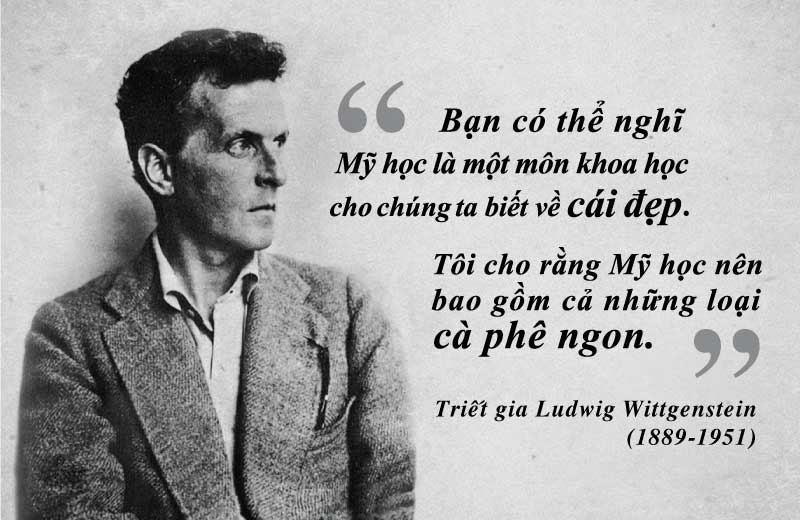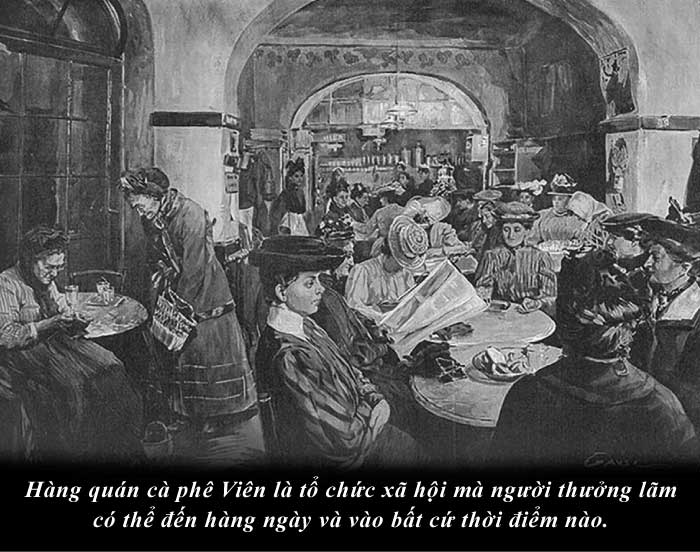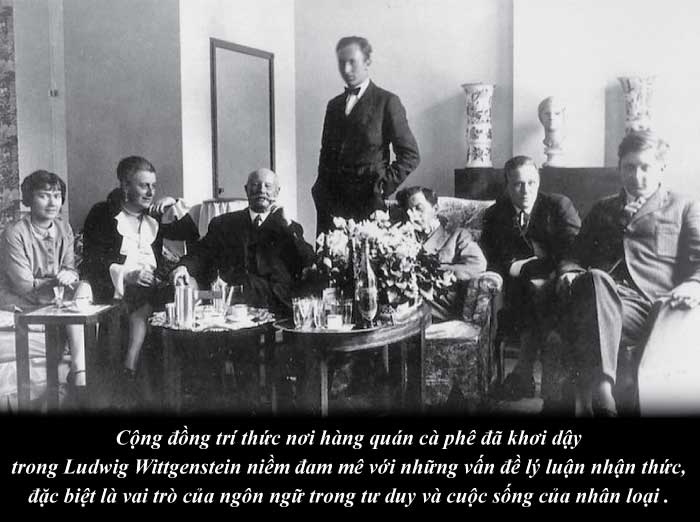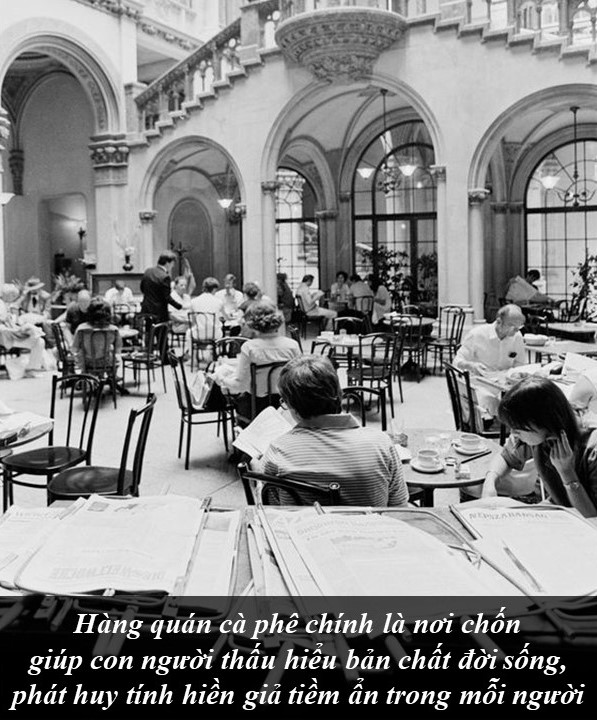Article 38: Philosopher Ludwig Wittgenstein and philosophy through coffee enjoyment
The coffee society in Vienna created a wonderful atmosphere for the philosopher Ludwig Wittgenstein to initiate new ideas that contributed to the diversification of the intellectual confluence of the era of the “cultural boom”.

“You might think of Aesthetics as a science that tells us about beauty. I think aesthetics should include good coffee.” – Ludwig Wittgenstein (1889-1951)
Entering the 19th century, nationalism flourished, with the desire to build a nation on the basis of national identity and develop its own ideology. This trend at the same time denied the independence that existed in multi-ethnic countries. At that time, in Vienna, an intellectual class formed in Vienna, trying to build a philosophy with Austrian identity, opposing the view that denied there was an independent ideology here.
It was the Austro-Hungarian monarchy, which was difficult to define clearly geographically or ethnically in this multi-ethnic country. Although German language dominated and became the main one, it still showed absorption and mutual influence where it blended the Indo-European (Slav) and Roman languages, gradually forming a cultural-historical continuum to the extent that this language covered the whole of Austria with two republics during the 20th century. Therefore, to single out the independence and unity of Austria it cannot be found in the ethnic, political domains but to look for in the “spiritual field” in philosophy. Stemming from Bernard Bolcano’s critical stance on language in order to demand respect for ethnic differences while recognizing the relativity of language with different ethnic groups, the philosophy of language developed strongly and became one of the characteristic trends of Austrian thought of this period. And the person who brought the philosophy of language to the top was Ludwig Wittgenstein.

The Viennese coffee house is a social organization that visitors can visit every day and at any time.
Coming from an industrial family, Ludwig Wittgenstein initially studied technical subjects to become an engineer. However, with a growing interest in mathematics and logic, Ludwig Wittgenstein was more interested in the field of philosophy. And that interest only really surfaced when he became acquainted with and talked to philosophers in a Viennese cafe while teaching in a small village in Lower Austria.
It was in this wonderful intellectual community that Ludwig Wittgenstein had the opportunity to talk with the positivists of the typical Viennese philosophy club such as Moritz Schlick, Rudolf Carnap, etc. about the development of logic science through mathematics. This awakened in him a passion for cognitive reasoning problems, especially the role of language in human thinking and life. He concluded that metaphysical questions (the question of existence and the origin of existence) were essentially unanswerable. Philosophy essentially worked to elucidate language, and the philosopher’s sole task was to point out the meaninglessness and inability to answer these metaphysical problems. Since then, Ludwig Wittgenstein had successfully implemented two times to radically reform the philosophical worldview of the era. The first was conceptually oriented towards the logic of an ideal language. The second time, in his later philosophy, he made the view that application was the decisive criterion of language.

The intellectual community in the cafe has awakened in Ludwig Wittgenstein a passion for cognitive reasoning problems, especially the role of language in human thinking and life.
Living in the intellectual community associated with the cafes in Vienna, not only the space and the connection with the philosophers’ network influenced Ludwig Wittgenstein, but this wonderful drink opened the inspiration to pursue philosophical problems in him. A famous axiom of Ludwig Wittgenstein opened up an interesting philosophical investigation into the role of language in the enjoyment of coffee: “Can you describe the taste of coffee?” Examining many coffee quotes by the writer Honozé de Balzac, he found that each quote gave a different feeling: sometimes coffee is a source of energy that awakens the mind, other times it is mentioned as An element that helps fill energy, balance life, or is like a way to understand the coffee drinker’s soul. Aware that it was difficult to capture the full extent of the “coffee experience”, Ludwig Wittgenstein concluded his interesting philosophical investigation that words cannot fully describe, but only conveys the human experience at the time of speaking. This became one of the important axioms to complete his philosophical thought system and was fully conveyed in the work “Philosophical Investigations”. The work played an important role in marking a turning point in the development of Ludwig Wittgenstein’s philosophy in the late period, when he focused on deepening linguistic phenomena in their early usage, leading to clear awareness of the purpose and function of words.

Coffee shops were places to help people understand the nature of life and promote the hidden sage in each person.
This thought of his strongly influenced a series of successive philosophical schools from hermeneutics, speech activism to postmodernism and postpositivism. Ludwig Wittgenstein was recognized as the great philosopher of the 20th century for dealing with the problems of philosophy, including the problem of rethinking the nature of philosophy and the problem of language as a way of man approaching the world and himself.
In that view, the coffee shop in Vienna was a place to help people understand the nature of life and promote the hidden sage in each person. This place made an important contribution to Ludwig Wittgenstein’s process of finding the connection between the world (reality), thought and language. And the coffee shop also became a kind of democratic club, an indispensable ideal social organization among member intellectuals, providing opportunities for them to meet and talk, freely debate, open up their minds, forming a wave of thought trends in the era of “cultural boom”.
THE REAL COFFEE
ROASTED ONLY FOR PEOPLE OF WISDOM!
Source: “The Philosophical Way of Coffee” – copyright by Trung Nguyen Legend


